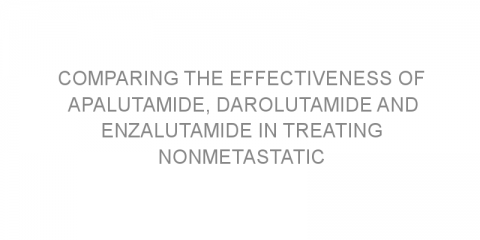In a nutshell This review compared the outcomes of 2 techniques for robotic-assisted radical prostatectomy (RARP; complete removal of the prostate gland using robotic arms): Retzius-sparing (RS)-RARP and conventional (C)-RARP in patients with localized prostate cancer (PCa). The analysis showed that RS-RARP was associated with improved urinary...
Read MoreCurrent stage -Stage II Posts on Medivizor
Searching for patients with confined prostate cancer to trial a cryoablation procedure
In a nutshell This trial is looking to examine the use of a new treatment software (UroNAV Ablation) system in treating confined prostate cancer with cryoablation. The main outcomes to be measured will be device/treatment-related complications and tumor control. This trial is being carried out in New York, US. The details Localized...
Read MoreComparing the effectiveness of apalutamide, darolutamide and enzalutamide in treating nonmetastatic castration-resistant prostate cancer
In a nutshell The study compared outcomes of apalutamide (A; Erleada), darolutamide (D; Nubeqa), and enzalutamide (E; Xtandi) in treating nonmetastatic castration-resistant prostate cancer (nmCRPC). The authors found that A and E had better metastasis-free survival (MFS) compared to D. Some background Men with CRPC fail to respond to...
Read MoreComparing cryosurgery and hormonal therapy for locally recurrent prostate cancer after radiotherapy
In a nutshell This study compared local cryosurgery (CRYO) against androgen deprivation therapy (ADT) for the treatment of locally recurring prostate cancer (LRPC). The study found local cryosurgery had a longer overall survival (OS) when compared to ADT. Some background LRPC is cancer that has re-occurred in the prostate gland...
Read MoreSurvival after radiotherapy vs. prostate surgery for intermediate-risk prostate cancer.
In a nutshell This study aimed to investigate the outcomes of intermediate risk-risk prostate cancer after different treatments. This study concluded that prostate surgery might have a higher survival than radiotherapy. Some background There a several options to treat intermediate-risk prostate cancer (IR-PC). Radical prostatectomy (RP; surgery to...
Read MoreLong term results discussing radiotherapy and hormone therapy treatments for patients with prostate cancer
In a nutshell This study aimed to evaluate whole pelvic radiotherapy (WPRT) compared to prostate only radiotherapy (PORT) with hormonal therapy (HT) before or after radiation for patients with intermediate- or high-risk prostate cancer. This study found that HT before radiotherapy and WPRT had superior long-term survival without cancer growing or...
Read MoreComparing robot-assisted laparoscopic prostate surgery versus open prostate surgery
In a nutshell This study aimed to compare traditional open surgery and robotic surgery to treat prostate cancer in terms of side effects. It found that there was no difference in side-effects like sexual function or urinary problems between the two surgeries. Some background Prostate surgery is a treatment option for prostate cancer. This surgery...
Read MoreDo side-effects vary between risk groups after treatment for localized prostate cancer?
In a nutshell This study aimed to determine whether differences in side effects reported over time in patients who had surgery or radiotherapy varied by risk group. This study found that for men with low-risk prostate cancer, radiotherapy was associated with higher sexual function scores at 3 years than surgery;...
Read MoreComparing radiotherapy treatment regimens for prostate cancer
In a nutshell This study aimed to evaluate two different timelines of delivering radiotherapy, 56 Gy delivered in 16 treatments or 67 Gy delivered in 25 treatments, to the prostate. This study found that both treatments are safe and effective in the treatment of prostate cancer. Some background Hypo-fractionated radiation therapy...
Read MoreImaging and biopsy in men undergoing active surveillance
In a nutshell The authors aimed to determine whether multiparametric magnetic resonance imaging (mpMRI)/ultrasound fusion biopsy improves Gleason grade detection compared to systematic biopsy in active surveillance. The authors concluded that due to the low sensitivity of mpMRI for detecting cancer grade 7 or higher, systematic biopsy will still need...
Read MoreSearching for men with intermediate- or high-risk prostate cancer to test a short course of very focused radiation therapy
In a nutshell This phase 2 trial aims to compare conventional radiation therapy with a very focused type of radiation therapy for intermediate- and high-risk prostate cancer. The main outcome to be investigated is the number of side effects and the rate of disease recurrence at 5 years. The trial is recruiting in British Columbia, Canada. The details...
Read MoreSurvival benefits for men treated with local therapies before starting chemotherapy
In a nutshell This study examined the benefits of administering local therapies before chemotherapy for prostate cancer. Researchers reported lower mortality risks for men treated with local therapies before chemotherapy. Some background Local therapies, such as surgery or radiation, are first-line treatments for localized (confined) prostate...
Read More






